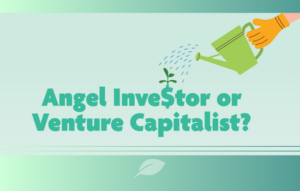
The term start-up first appeared in the business world in the early 1970s. It usually describes a technology-type business. With it, a new segment of U.S. investors — the angel investor and the venture capitalist — emerged. As with many business-world philosophies, these approaches have also worked their way into our churches.
ANGEL INVESTOR
For many, the word angels suggests shiny beings with halos and wings (although Scripture does not mention angels having either halos or wings). Most of the time, angels stood out from humans and were shocking, causing great fear in the humans who encountered them when they delivered their messages from God. Yet, they are still alike enough to be mistaken for humans.
In the business world, an “angel investor” describes an individual who invests initial seed money to help a startup or invests in a company during the earliest stages. This investment usually carries some ownership, includes decision-making responsibilities, and grants certain privileges. Angel investors usually invest in a company because they believe in the ideas, leadership, and business model. While investing with expectation of reward, they expect it only when and if the business takes off. Angel investors often wait years before receiving the first financial benefit from their investments into a company.
VENTURE CAPITALIST
Venture capitalists are known for their risk-taking in the start-up world. They usually involve firms or a collective group of investors who pool money to invest in a start-up. The firm, however, usually doesn’t invest at the beginning of a start-up but during later stages when the potential of gaining a return on investment (ROI) is greater and they can capitalize on the upswing of the company in a relatively short time window. While venture capitalists experience a high failure rate, because they pool assets, they spread the risk around and expect massive returns on those investments that prove successful.
Angel investors focus on one, or maybe a handful, of companies about which they are passionate or support things they value. Venture capitalists jump aboard companies about to skyrocket in value, accepting high risk for the sake of potential high reward. Truthfully, it usually takes both angel investors and venture capitalists working together to take a start-up to the next level.
So, here is the question. When it comes to the church and ministry world, which are you, and how does your church operate? Angel investors or venture capitalists? Does it matter?
It does matter! It matters because how you and your church operate makes a big difference in how your church gets things done. Identifying the “angels” in your church who are willing to embrace new endeavors, believe in the process, and understand the end goal is vital to getting it started. These may not be the people with the idea, but they have the resources to “invest” at the start to help get things moving.
One word of caution: be careful not to make your “angels” the go-to for everything. It is common for churches to use their “go-to” team so much they either burn out or are spread too thin to be effective. Also, not every endeavor will be something about which an “angel” would be passionate. Look for several angels and find endeavors that align with their gifts and passions. Identify and communicate with them as new ideas are presented to add resources and expertise to those ideas.
Churches also should make use of their “venture capitalists.” These individuals are willing to join something already up and running and push it to the next level. Let them handle the many endeavors the church will host or launch. They provide an infusion of resources that can bring success for the endeavor. These individuals can be used and want to be involved. They work better as a pool or group, avoiding burnout or being stretched too thin. This allows them to be involved in more programs the church is doing.
Understanding who you are and identifying who is in your church allows better resourcing of new ideas and endeavors of the church. Identifying “angels” and “venture capitalists” will protect members from burnout and make everyone more efficient in handling church outreach and initiatives.
As believers, we are all equipped to be involved in ministry, but finding the role that best suits our skills and passions allows us to be most effective in ministry.
This article was previously posted in the August/September 2024 edition of ONE Magazine.


